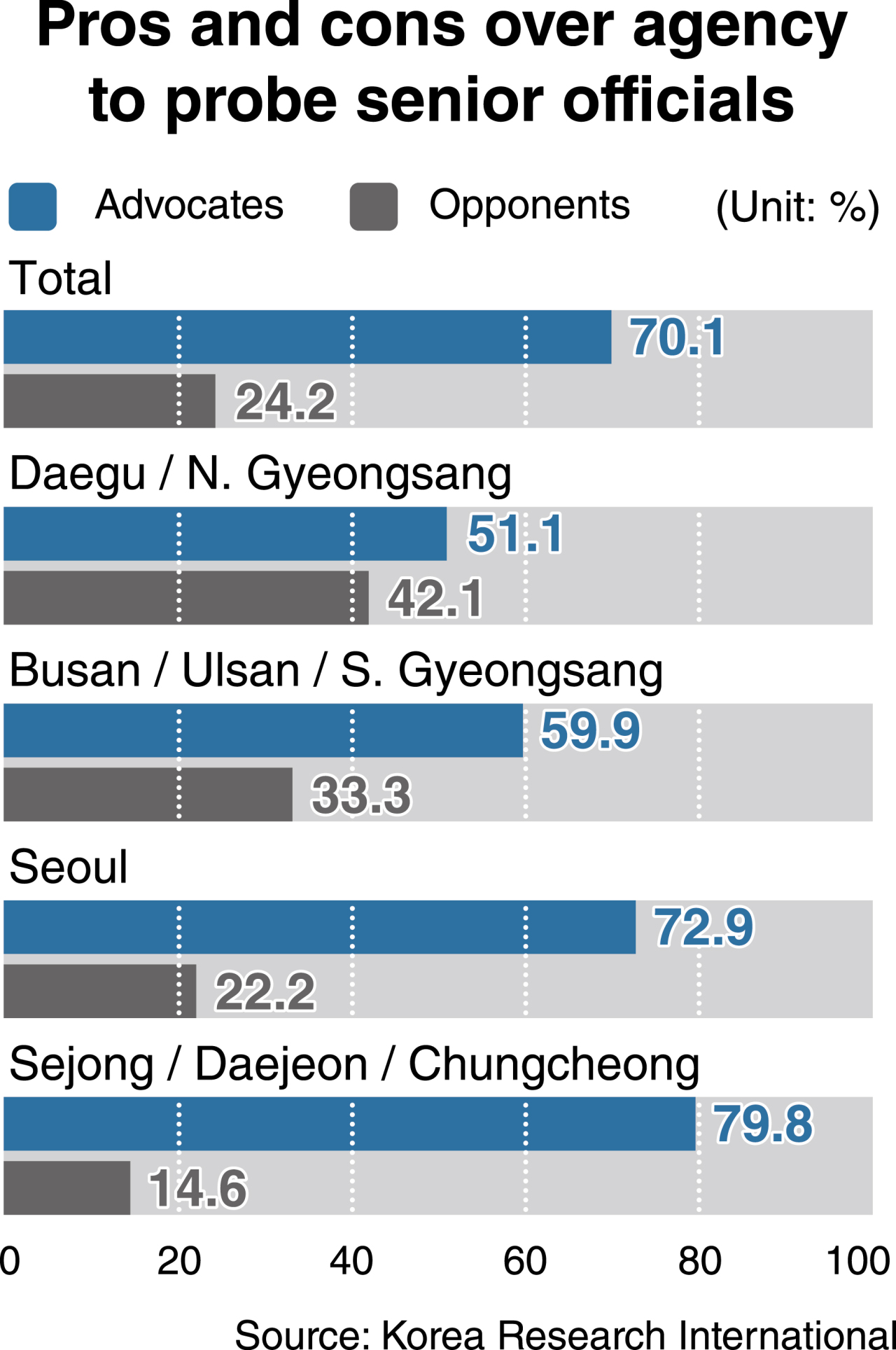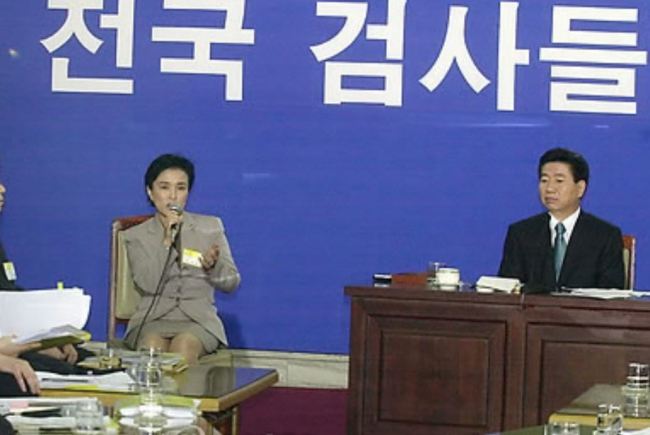[News Focus] Most Koreans back new entity to investigate prosecutors: poll
By Kim Yon-sePublished : May 9, 2019 - 12:04
SEJONG -- In South Korea, police have no authority to investigate prosecutors who are suspected of malfeasance without getting approval from the prosecution that controls their investigation.
In addition, there is no way for the courts to punish corrupt prosecutors if the prosecution eventually chooses not to indict the suspects even if some evidence is found to prove their allegations.
The exclusive rights for controlling investigations and indictments, held by the prosecution, have caused a lot of side effects involving power abuse, politicians across ideological lines and the public have pointed out for decades.
In addition, there is no way for the courts to punish corrupt prosecutors if the prosecution eventually chooses not to indict the suspects even if some evidence is found to prove their allegations.
The exclusive rights for controlling investigations and indictments, held by the prosecution, have caused a lot of side effects involving power abuse, politicians across ideological lines and the public have pointed out for decades.

Some online commenters argue that the prosecution has tried not to yield its vested rights in terms of its authority. They allege that the prosecution has sought to prevent corruption by one of their own from being publicized.
As a result, a large portion of people support a state proposal to create a new entity to probe allegations against high-profile public officials such as the president, lawmakers, ministers, prosecutor general, judges and prosecutors.
While the Senior Civil Servant Corruption Investigation unit is targeted at all senior government officials, prosecutors have fiercely opposed the independent agency as it is a core part of the prosecution-reform scheme.
The plan to revamp the prosecution’s authority was vigorously pushed by the former Roh Moo-hyun government, which took office in 2003.
But the former liberal president’s plan went down the drain amid strong resistance from the prosecution and then-main conservative opposition Saenuri Party, now rechristened Liberty Korea Party.
Ex-President Roh, in only two weeks after taking office in February 2003 -- in collaboration with then-Justice Minister Kang Kum-sil -- held a debate with about 40 state prosecutors on TV, during which many people in person witnessed their opposition toward the reform plan. Many people say they felt that some of the prosecutors were needlessly asserting themselves without any grounds.
Still, the main opposition Liberty Korea Party is desperate to stall the plan to set up the agency.
Prosecutor General Moon Moo-il is also lukewarm toward the Cheong Wa Dae-led scheme. His response came as the National Assembly fast-tracked a bill on handing over some of the prosecution’s investigation authority to police. Although, he has yet to reveal his view on the new criminal entity. The sharing of investigative rights between the prosecution and police is another core part of the reform plan, alongside the establishment of an independent investigation unit.
An editorial writer from a conservative newspaper who recently appeared on a cable TV program expressed his skepticism over giving some investigation authority to police.
Nonetheless, he said that “a certain portion of conservative-minded people as well as liberals are in favor of prosecution reforms.” He cited the Choi Soon-sil influence-peddling scandal during the previous Park Geun-hye government, in which some prosecutors were allegedly involved, as the reason why many conservative citizens also support reforms.
A poll, conducted by Korea Research International and MBC, also showed that the majority of people are in favor of the new independent entity. While 70.1 percent of the surveyed 1,000 people responded that they support the entity, only 24.4 percent said they oppose it.
Furthermore, 49.7 percent of those, who revealed their identity as conservatives, supported it, while 46.2 percent of the conservative respondents were against it.

Another noteworthy point is the approval across regions -- the percentage of proponents of the investigation unit exceeded that of opponents among those residing in Daegu and neighboring North Gyeongsang Province, the home turf of Liberty Korea Party, by 51.1 percent vs. 42.1 percent.
The split opinion was 59.9 percent vs. 33.3 percent in Busan-Ulsan-South Gyeongsang Province.
In addition, advocates far outnumbered opponents in Gwangju-South Jeolla Province (80.1 percent vs. 10.1 percent), Sejong-Daejeon-Chungcheong (79.8 percent vs. 14.6 percent) and Jeju-Gangwon (79 percent vs. 14.9 percent). The percentage of proponents among Seoul and Gyeonggi-Incheon residents was 72.9 percent and 72.4 percent, respectively.
The poll, however, showed that on the issue giving investigative authority to police, people are somewhat divided (57 percent approval vs. 31.6 percent nationwide. The survey result was released on May 8.
Some online commenters have expressed concerns that some policemen could exploit their authority -- like recklessly investigating ordinary citizens.
A few claim the most significant part of the reform scheme is giving “both investigation and indictment” authority to the Senior Civil Servant Corruption Investigation unit.
“Many news outlets are highlighting the tug-of-war between prosecutors and policemen over the investigative rights than the bill on the new agency,” a commenter said. “Real reforms would be based on setting up the third independent entity in public interest and for justice -- as a counterbalance to the traditional system of criminal investigations.”
By Kim Yon-se (kys@heraldcorp.com)



![[Herald Interview] 'Amid aging population, Korea to invite more young professionals from overseas'](http://res.heraldm.com/phpwas/restmb_idxmake.php?idx=644&simg=/content/image/2024/04/24/20240424050844_0.jpg&u=20240424200058)












![[KH Explains] Korean shipbuilding stocks rally: Real growth or bubble?](http://res.heraldm.com/phpwas/restmb_idxmake.php?idx=652&simg=/content/image/2024/04/25/20240425050656_0.jpg&u=)

